#related to the star wars attachment discourse but not explicitly about it
Explore tagged Tumblr posts
Note
I feel it’s odd how many people seem absolutely determined to say how important romantic relationships are. Like I’m not interested in a romantic relationship, that just isn’t my vibe, but I still deeply care for everyone around me (even the people I disagree with, I still want them to have decent lives). The over emphasis on romantic relationships fails to show exactly how much people can and will give to others outside of that.
I'm sorry if those people don't love their families, don't love their friends, don't love their pets, don't love their community, don't enjoy any media, don't have any self-steem and don't have any sort of goodwill towards humanity.
I'm sorry they are miserable assholes, basically.
#related to the star wars attachment discourse but not explicitly about it#not really star wars but related#pro jedi culture#on attachment#attachment isn't love#again. related but not explicitly about either lf these things#amatonormativity
11 notes
·
View notes
Text
The Tragic Hero Full of Fear
Hello everyone! Before I get into this, I’d like to thank @jasontoddiefor for both the name and being the main enabler of this fun piece of writing. I also want to thank all my wonderful friends over on Discord for letting me bounce ideas off of them and helping me. You are all amazing!!
Ok, so let’s get into it!
The first six Star Wars movies (the Original and Prequel trilogies) are commonly referred to as “the Tragedy of Darth Vader.” But what makes these movies a tragedy? How is Anakin Skywalker himself, the main character of said tragedy, a tragic hero? In this meta/essay, I will discuss how Anakin himself is definitionally a tragic hero and outline his story as it relates to the structure of a classic Greek tragedy.
This essay will focus solely on Anakin’s character as he is canonically portrayed.
The Hero
Let’s go through the main traits of a tragic hero (as per early literature) and discuss them in the context of Anakin Skywalker.
Possesses immense courage and strength and is usually favored by the gods
Anakin’s courage is evident throughout his entire life, such as when he participates in the pod race in TPM or on the front lines during the Clone Wars.
While we cannot definitively ascribe Anakin’s abilities to any deity, we can associate them with the Force. The Force is able to somewhat influence the happenings of the universe in certain ways and takes the place of any sort of deity.
Whether Anakin is the “Chosen One” or not, his connection to the Force is stronger than that of any other Force-sensitive being, so he is consequently closer to it than most, if not all, other Force-sensitive beings.
Extreme loyalty to family and country
Anakin is consistent in his demonstrations of loyalty to those he has strong feelings for (whether those feelings be romantic or platonic).
His devotion to Padmé surpasses his loyalty to the Jedi, and he is always willing to go to great lengths to ensure their safety and well-being.
Anakin also exhibits a strong sense of devotion to his mother, Shmi. His devotion to her, and by extension her wellbeing, surpasses his duties as Jedi.
In ROTS, Anakin says, “I will not betray the Republic… my loyalties lie with the Chancellor and with the Senate… and with you” (you, in this case, referring to Padmé). In this quotation, Anakin’s loyalties are made quite clear. At this point, he is not faithful to the Jedi, but to his government, its leaders, and, of course, his wife.
Representative of society’s current values
During the Clone Wars, Anakin is known by the moniker, “the Hero with No Fear,” and is one of the Republic’s “poster boys.” He is charismatic, kind, seemingly fearless (obviously) and a strong fighter, thus representing the values that were important to the Republic at the time. The last characteristic is especially important because of the assurance it instills in times of war. As a representation of the Republic, Anakin’s prowess on the battlefield creates hope for its citizens that victory is possible.
Anakin also empathizes with the opinion that the seemingly outdated Jedi Code holds them back. In the Citadel Arc, Tarkin remarks that “the Jedi Code prevents [the Jedi] from going far enough to achieve victory.” Anakin actually agrees with this statement, replying that “[he’s] also found that [the Jedi] sometimes fall short of victory because of [their] methods” (Season 3, Episode 19). He shows a sense of allegiance not to the ancient ways of the Jedi, but to the newer, more modern ideals regarding military action.
Anakin claims to have brought “peace, justice, freedom, and security” to his “new Empire.” While the Empire's interpretations of the aforementioned values are skewed, Anakin continues to represent them as Darth Vader.
Anakin’s statement to Obi-Wan also mirrors Palpatine’s declaration to the Senate: “In order to ensure our security and continuing stability, the Republic will be reorganized into the first Galactic Empire, for a safe and secure society which I assure you will last for ten thousand years.” The people applaud this statement, demonstrating a general sense of exhaustion in regards to the war and a yearning for what this new Empire is promising them.
Lead astray/challenged by strong feelings
Though there are many, many examples of Anakin’s emotions getting the better of him, we’re simply going to list two:
Anakin’s fury and anguish after the death of his mom leads to his slaughter of the Tuskens
Anakin’s overwhelming fear of losing Padmé is ultimately what leads to his Fall.
Every tragic hero possesses what is called a hamartia, or a fatal flaw. This trait largely contributes to the hero’s catastrophic downfall. Anakin’s hamartia is his need for control, which partially manifests through his fear of loss.
Let’s explore this idea in more detail.
Though Anakin grows up as a slave, the movies neglect to explicitly cover the trauma left from his time in slavery. However, it is worth noting that slaves did not have the ability to make many choices for themselves; they didn’t even own their bodies. After being freed, Anakin is whisked away to become a Jedi. He does not possess much control over his life as Jedi, for he is simply told what path he is going to take. While Anakin does make this decision on his own, becoming a Jedi is a disciplined and somewhat-strict way of life and not one that allows for an abundance of reckless autonomy as he is wont to engage in.
(Side note: I’m not here to argue about Qui-Gon’s decision-making abilities, nor do I wish to engage in discourse regarding the Jedi’s way of life. I am simply presenting and objectively stating these facts in relation to Anakin because they are pertinent to my point.)
During AOTC, Anakin is unable to save his mother from death. As Shmi dies in his arms, Anakin is absolutely helpless. The situation is completely out of his control, and he is forced to contend with the reality that despite all of his power, he cannot control everything that happens.
He also feels that he has a larger potential for power and is being held back by Obi-Wan: “although I'm a Padawan learner, in some ways... a lot of ways... I'm ahead of him. I'm ready for the trials. I know I am! He knows it too. He believes I'm too unpredictable… I know I started my training late... but he won't let me move on.” Anakin believes Obi-Wan, his teacher and mentor, is holding him back. He expresses a self-held conviction of his status and skills and does not trust the word of his superior.
In ROTS, Anakin starts dreaming of Padmé��s death. Considering what occurred the last time he dreamt of a loved one’s demise, Anakin is justifiably (or at least justifiably from his point of view) worried. He consequently wants to stop these dreams from coming true in any way possible. His fear of death, especially that of his loved ones, represents his need for control over everything, even things that are uncontrollable. This overwhelming desire leads to Anakin’s drastic actions.
As Darth Vader, he no longer possesses such fears, for everyone that he loved is either dead or has betrayed him. He is the epitome of order and control, eliminating any who disturb this perceived equilibrium.
However, this changes because of one person: Luke Skywalker.
Luke reintroduces something that was (arguably) long-absent in Vader’s life, which is interpersonal attachment. Vader yearns for his son to join him by his side. When Luke refuses, Vader continues to attempt to seek him out. In ROTJ, Vader is forced to choose between the Emperor, a man he has long trusted and followed, and Luke, the son he never knew he had. Out of a desire to protect and keep what little family he has left (and likely a sense of “I couldn’t save Padmé but at least I can save her legacy by keeping her child(ren) alive and safe”), Vader defeats the Emperor and saves his son. Though his actions are definitionally heroic, Anakin never truly overcomes his hamartia.
The Structure of a Tragedy
Classic Greek tragedies follow a specific story structure, which, according to the German playwright Gustav Freytag, is as follows:

We’re going to focus on the three aspects that best represent Anakin’s story as a tragedy: The peripeteia, the anagnorisis, and the catastrophe/denouement. These occur during and/or after the climax.
The peripeteia is the climax/the turning point in the plot. Said change usually involves the protagonist's good luck and prosperity taking a turn for the worse.
Within the tragedy we are discussing, the peripeteia occurs when Anakin chooses Sidious over Mace Windu and solidifies his allegiance to the Dark side, becoming the very thing he swore to destroy. It is at this point that things really start to go downhill. He kills children, chokes his wife, fights his best friend, gets his remaining limbs cut off, etc.
The anagnorisis is the point in the tragedy when the protagonist recognizes their error, seeing the true nature of that which they were previously ignorant of, usually regarding their circumstances or a specific relationship (such as Oedipus’ realization that his wife was actually his mother). In most tragedies, the anagnorisis is in close proximity to the peripeteia. In Anakin’s story, the anagnorisis occurs during ROTJ. After being wounded in his fight against Luke, Vader watches as his son is brutally electrocuted by Sidious. It is at this moment that Darth Vader realizes that Luke was right—there is good in him, and he still has the chance to redeem himself.
The catastrophe/denouement (since this is a tragedy, we’re going to go with “catastrophe”) is the end of the tragedy. Events and conflicts are resolved and brought to a close, and a new sort of “normality” is established. The catastrophe often provides a sense of catharsis (release of tension) for the viewer. The protagonist is worse off than they were at the beginning of the tragedy.
The catastrophe within “The Tragedy of Darth Vader” transpires soon after the anagnorisis at the end of ROTJ. Though the realization of his capacity for good is the anagnorisis, the follow-through (via his actions), as well as what consequently occurs, is the catastrophe. As previously discussed, Vader saves Luke by killing the Emperor but does so at the cost of his own life. This serves as the resolution of the tragedy, for the hero’s fate has been confirmed—Darth Vader fulfills his destined role as the Chosen One and, in doing so, brings about his own redemption and dies as Anakin Skywalker.
In conclusion, the categorization of Star Wars as a tragedy is a choice that heavily influences Anakin, the protagonist and hero, of the story. He is without a doubt a tragic hero whose fatal flaw leads to his downfall. In accordance with Aristotle’s theory of tragedy, Anakin’s tragedy is constructed not by personal agency, but by the narrative itself.
Works Cited
“Darth Vader.” Wikipedia, Wikimedia Foundation, 15 Mar. 2021, en.wikipedia.org/wiki/Darth_Vader.
“Dramatic Structure.” Wikipedia, Wikimedia Foundation, 20 Feb. 2021, en.wikipedia.org/wiki/Dramatic_structure.
“Hero.” Encyclopaedia Britannica, Encyclopaedia Britannica, Inc., 19 Oct. 2016, www.britannica.com/art/hero-literary-and-cultural-figure.
Lucas, George, director. Star Wars: Episode III— Revenge of the Sith. Lucasfilm Ltd., 2005.
Lucas, George, director. Star Wars: Episode II— Attack of the Clones. Lucasfilm Ltd. , 2002.
Michnovetz, Matt. “Star Wars: The Clone Wars, ‘Counterattack.’” Season 3, episode 19, 4 Mar. 2011.
“Sophocles: the Purest Artist.” Encyclopædia Britannica, Encyclopædia Britannica, Inc., www.britannica.com/art/tragedy-literature/Sophocles-the-purest-artist.
“Theory of Tragedy.” Encyclopædia Britannica, Encyclopædia Britannica, Inc., www.britannica.com/art/tragedy-literature/Theory-of-tragedy.
“Tragic Hero.” Dictionary.com, Dictionary.com, www.dictionary.com/browse/tragic-hero.
#star wars#Anakin Skywalker#greek tragedy#anakin the tragic hero#meta#so many meta ideas not enough time#wow thanks tumblr formatting for being terrible
183 notes
·
View notes
Text
Jessa/Wessa ship wars
teenagefunbouquet said:Isn't it enough Tessa&Jem got a wedding comic, two kids (and you say more), a lifetime as the only mates for each other and your most explicitly written sex scene After the Bridge? Wessa are the most popular and we get nothing, every wessa moment is shared with Jem while Jessa get to be alone, Wessa fans got no "anticipation" like jessa fans are getting now everyday you give them a book in jem's pov or a short story or a new kid. it feels like wessa is dead.
I’ll be interested in people’s thoughts on this. (I left the username as is since it’s a blank account, probably created to ask this question, so no one’s really getting hurt in this minor drama.) Most of my long and somewhat crabbish post is under the read more.
First, let me reply with the obvious, which is the Jessa rebuttal: “Isn’t it enough that Will gets to be Tessa’s first love and Jem only gets to be her second? Isn’t it enough that Will and Tessa had sex when they thought Jem was dead? Isn’t it enough that there’s a whole series about Will and Tessa’s kids but we only find out that Jem and Tessa had a kid in a short story? Isn’t enough that Jem and Tessa have spent half their relationship looking for a kid who’s related to Will, not either of them? Isn’t it enough that Will and Tessa got two biological kids they got to spend eighteen years raising and Jem and Tessa only get like two years with Kit? Jessa are the most popular, but half the stories in Ghosts of the Shadow Market happened while Will was still alive! And now Wessa fans are getting content every day and have two more books of Wessa being married and doing cute stuff to look forward to. Every day they’re getting a special edition of a book with a whole short story about their wedding. It feels like Jessa is dead.”
Not that I believe any of that either: I think both complaints are equally silly and selfish. But they are complaints rooted in the same logic, which is “My ship is the best and most popular, and every time I see something that in my mind supports the ship I hate I feel angry and diminished, and rather than perhaps examining those feelings I’d like to vent them on other fans and the creator.”
So. My feeling about this is: I am sad to see there is still some kind of a ship war here. As far as I am concerned...
the Wessa/Jessa ship war ended in 2012 when we found out Tessa loved both boys equally and would spend a lifetime with both of them. The end. Quibbling about irrelevant details like how many kids each couple has subsequently or examining closely the explicitness of their sex scenes seem bizarre and pointless. It has nothing to do with how books and stories are made, or how they work, or what functions they serve. At this point it’s like you decided your favorite football team could definitely beat another team, and you spend all your time obsessing about it even though they will never play against the other team because the other team is a hockey team.
When I see people say that “Wessa got” something or “Jessa got” something, it makes me cringe. It reduces stories that are about other things, often friendship, to being about a ship war I am not a part of. (Not every story or book in which a couple appears is a story about that ship. Sometimes they’re just grouting their shower or fighting a demon.) Wessa and Jessa are not dueling pop stars fighting over who gets to perform on the Tonight Show. In fact, they are not fighting at all, which is part of the underlying problem. People are used to love triangles where two guys are fighting over a girl and are jealous of each other. Will and Jem are not jealous of each other. They are not fighting over Tessa. To believe that it lessens Will and Tessa’s relationship that Jem is around and alive, or that it makes Jem and Tessa’s relationship better that Will is dead, is a fundamental misunderstanding of these characters and the story they are in. You are trying to shove a square peg into a round hole, and it will cause you endless misery and frustration.
For instance, claiming that “every Wessa moment is spent with Jem.” Well, that’s ridiculous. Obviously, Will and Tessa spent an enormous amount of quality time alone together in TID. (Otherwise, you would have no investment in this relationship in the first place. There’s a reason you’re attached to it.) Jem did not attend their wedding. He is around in Chain of Gold mostly in his role as a Silent Brother: tending the sick, helping James, bringing news. He is not around during the scene where Will and Tessa make love, or when they kiss and cuddle in the drawing room, grossing out their kids. (I had to fight very very hard to retain even one scene of Will and Tessa alone: in a normal YA book, you would never see a sex scene between the parents, from their point of view.)
The problem is not that there is no “Wessa content” to “anticipate.” The majority of Wessa fans are happy to enjoy stuff like the wedding story or the Wessa moments in TLH. The problem is that the person asking this question will only accept a TLH book in which Jem isn’t mentioned at all as “Wessa content,” and since that would be a fundamental and appalling betrayal of the story and characters — something I would never write and never consider — they will forever feel they are not getting what they deserve.
Asker: if you think that it’s somehow better for Jem and Tessa that Will is dead, that they “get” something that Will and Tessa don’t by having had something awful happen to them, then I do not even know how to begin to speak to you. What has always been meaningful to me about Will, Jem and Tessa is that they all loved each other equally. If that is not the case, then they are not people I am interested in writing about. If that being the case makes you not want to read about them, then you are free to stop — please do — but the story is not going to become something other than it is because you feel your ship is the “most popular.” (Which it is not in my experience, the ships are about equal, and I don’t know why it would matter if it was.)
In After the Bridge, which is not an explicit sex scene but rather a short story that contains sex (they exist!) Will is mentioned thirty-two times. Here’s an example:
“Jem swallowed, running his fingers up and down the blade. “He had only just died,” he said. She didn’t need to ask who he was. There was really only one He when it was the two of them speaking. “I was afraid. I saw what happened to the other Silent Brothers. I saw how they hardened over time, lost the people they had been. How as the people who loved them and who they loved died, they became less human. I was afraid that I would lose my ability to care. To know what this knife meant to Will and what Will meant to me.”
If you think Will isn’t present in Jem and Tessa’s relationship just because he’s dead, you’re wrong. He’s mentioned constantly. (And if someone thought that made it not Jessa content, I would have the same discussion with them: If Jem and Tessa didn’t care about Will, I wouldn't care about them.)
As long as there has been fandom, there have been ship wars. Social media has added a new dimension to that, which is what you’re doing here: the ability to run to the creator and complain, hoping they’ll side with you or give you what you want.
Here’s the problem: it’s really really toxic to have been involved in a clearly vicious ship battle for years. It will destroy utterly your ability to read or enjoy the canon you’re arguing about. I’ve been there, I’ve had friends be there. If you think it’s a point for Jem and Tessa that Will is dead, if you went into Last Hours thinking Jem wouldn’t be in it, that is a sign of a profound detachment from the actual reality of the canon books. You are not interacting with what I am writing or the characters as they are. You are interacting with the fight you are having. That is why your discourse has spun so far off from the books it no longer resembles what is actually happening in them, and demands such extreme gestures to be appeased — like leaving Jem out of Lost Book when he’s actually from the city the characters are visiting, or cutting him from Last Hours even though it would be unrealistic, cruel, and a disappointment to the vast majority of readers.
Dismissing every single moment Will and Tessa have together in TLH because Jem is alive somewhere and it’s bothering you is a recipe for you to be miserable. Clearly you didn’t enjoy the Wessa wedding, or the Will and Tessa love scenes in Chain of Gold. Clearly you consider Jem and Tessa having children not to be a reason for happiness but rather bitter rage even though it is totally irrelevant to Will and Tessa’s past relationship. The only thing that would be satisfactory would be a rewrite of Clockwork Princess in which Jem was run over by a tank and Will and Tessa didn’t care and were happy and got married and we never had to hear about Jem again. But because that would require time travel and a rewrite of Will and Tessa as vile assholes, that is not a thing you are going to get. If you are determined to always be miserable about the reality of what this story is, than the only result of that is that you will always be miserable.
There is never going to be a winner of this love triangle. It isn’t that story. No amount of anything I do is ever going to change that: no short stories I write, or content I produce, or books or sex scenes or longform poems about either couple will change the fact that both Will and Jem ended up with Tessa and she loves them equally. If you want a “somebody wins” kind of love triangle, there are other books that will provide that for you. These will never be those books.
So why did you write this long screed, Cassie, the rest of you might be wondering, and fairly. Three reasons. One is that there are other questions that are carbon copies of this one (as in, written by the same person/small group of people) cluttering up my inbox, and I want to put a stop to the idea that this kind of thing is going to be acknowledged as a valid comment or complaint. It’s not. Second, we have all been driven bananas by quarantine and I am no exception. The third is that this is the last time I am going to address this kind of ship-fight-disguised-as-question. Any further demands for me to favor one Tessa ship over another will be responded to with a link to this post. In the end I’m hoping this will be a time saver once we’re all allowed outside again.
2K notes
·
View notes
Text
Star Wars Parallels in History: Operation Paperclip and MKULTRA (AKA Why Kylo Ren Needs to Stop Being Called an Emo Whiny Bitch Who Doesn’t Deserve a Redemption Arc)
So I admit that this post comes out of complete frustration and disappointment with the anti-Kylos of the world who see Kylo Ren as a very black and white character who does not deserve a redemption arc. As many have pointed out, Anakin Skywalker’s whole story exists for the redemption arc at the end of ROTJ and somehow it’s okay if Anakin has one and yet not okay if Kylo gets one. I would argue that Ben Solo is far more deserving of a redemption arc and if Anakin can secure one I’ll be damned if Ben Solo is denied a chance to not only find “the light” but simply find the freedom to choose which side he’s on.
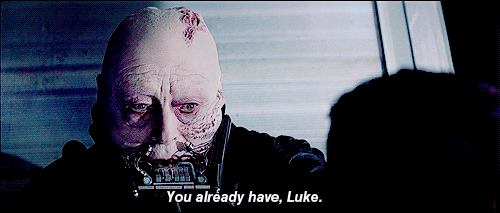
Why is Ben more deserving than Anakin? Well Anakin did consciously choose to go to the dark side. Yes, he was manipulated by Palpatine but I would not argue that it was systemic. Yes, we get hints of Anakin’s inclinations towards the dark side when he murders the sand people, when he consistently refuses the orders of the Jedi Counsel, when he forms a secret relationship with Padme (see inability to give a crap about the Jedi Order rules), and when—of course—he succumbs to his fear of losing Padme. However, Anakin’s strength is crippled slowly due to his own innate fear. Anakin’s fear is indeed his own and the choice to turn to the dark side is also his own.

Ben Solo is far more tragic. I absolutely resent any analysis of Kylo Ren that brushes him off as a whiny child whose daddy didn’t love him and thus he burned the planet down. Was Han Solo’s likely inability to be “World’s Best Dad” an issue? Sure. But, at most, this plot point helped to push the hold that Snoke had over Ben Solo to the edge. It does not, however, come close to defining what exactly transformed Ben Solo into Kylo Ren.
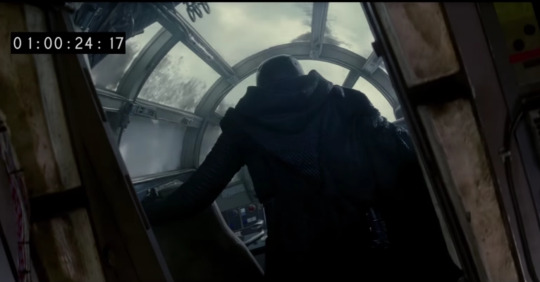
As we know from Aftermath, Snoke was targeting Ben from the womb. Which means that Ben—before he was even born—had the devil on his shoulder, the boogeyman in his closet, the monster under the bed that tried to shape his destiny and alter his free will. Anakin had a chance to develop the ideals of good and evil for himself. He had a chance to discover who he was without a powerful and dark force attempting to shape him at a highly impressionable age. Ben Solo never had a fair chance to decide who he was going to become.
I’m going to explore this statement through a bit of historical context that focuses on the CIA operation MKULTRA—a mind control operation that manipulated subjects into doing acts they would not have done otherwise. I have sourced anything that came from online sources, however, much of this comes from a book I own, “The CIA Doctors: Human Rights Violations by American Psychologists” by Dr. Colin Ross.
During this operation, the CIA used several tactics to brainwash their subjects—one of which required enlisting a magician for the purposes of hypnosis, illusion, deception, and trickery. In this scenario, Kylo Ren is the subject and Snoke is the magician, manipulating Ben through very convoluted and controlled acts of “magic” to trick Ben into believing stories/situations that created fears within him that were irrational or out of context of what happened (i.e. the legacy of his grandfather).
Historical Parallels in Star Wars Canon
For decades, sociologists, historians, and anthropologists have been dissecting the parallels between Star Wars and WWII (particularly the Empire and Nazi Germany). This has included discourse on everything from colors used in set design to the Empire’s uniforms to mannerisms and dialogue. The Force Awakens continues with these parallels with the First Order most explicitly during the scene where General Hux gives a speech in front of the sea of stormtroopers before launching the devastating attack on the Republic. The whole scene is ripped straight out of a Hitler speech in Nazi Germany.
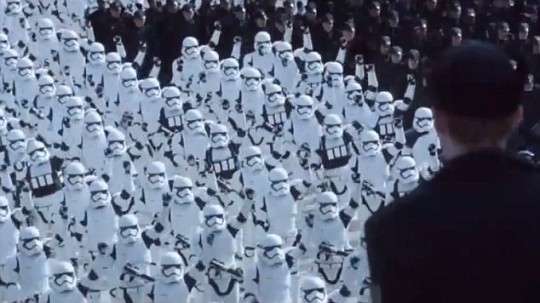
This scene in TFA is particularly important not because it is meant to hearken back to Nazi Germany but because it is supposed to symbolize the continuance of the Nazi Germany parallel (or the Empire). And in history this indeed did happen to an extent. After the Nazi empire came toppling down after their defeat in 1945, many of the strongest minds of Germany continued in the United States under Operation Paperclip rolled out by US intelligence agencies in the same year. Over 1,500 Nazi scientists, architects, doctors, technicians, and physicists were recruited by the United States in order to develop strategies that could combat the Russians during the Cold War. In other words, yes, the Nazi order was crumbling, but their smartest minds were rising (albeit covertly) in new places of power.
Where else do we know of a powerful leader who has lived through the rise and fall of the Empire only to gain (albeit covertly) a new position of power?

Huh…
Granted, we only have so much information about the First Order and there are still a lot of questions to be answered (the biggest of course being who Snoke actually freaking is, how Kylo and the Knights of Ren are attached, why the hell is the general of the order a 30-something (if even)…[this one may be just me but I do find Hux’s age intriguing and rather odd]). We do, however, know that there seems to be a component that is aware of everything going on in the order (Snoke, Hux, Phasma) and—in Snoke’s case—was a champion of the Empire. And there is a group that has been thrown into the First Order due to known instances of brainwashing and/or manipulation (Stormtroopers, Finn, Kylo Ren).
Operation Paperclip and First Order Leadership
From what we understand of the First Order, they rose from the ashes of the Empire, breaking the Galactic Concordance as they did so post ROTJ. Top figures heading the First Order including Snoke, General Hux, and Phasma who all seem to closely follow the Empire’s philosophy and beliefs on their own accord (Hux even seeing it as his mission to rule the galaxy from a young age). These characters directly parallel the Empire and continue the Empire’s legacy.
As stated before, this is similar to what happened post WWII with many elite minds of the Nazi order. In post WWII America, Nazis were saved from the Nuremberg Trials and brought into the U.S. for their brain power and knowledge of subjects including science, mathematics and psychology. These were intelligent people who carried with them the philosophy and will of the Nazis and that is exactly why they were brought over: they were ruthless and willing to do whatever necessary to defeat the Russians.
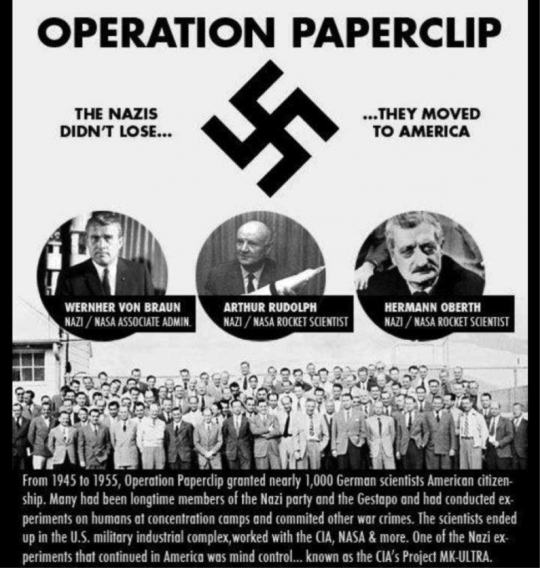
Snoke, Hux, and Phasma take the same mold. They are brought into the First Order because they believed in the dogma left behind by the Empire. They are willing to do whatever is necessary to defeat The Resistance and the New Republic (NOTE: This is not to say that the New Republic is like Russia in the 1940s-1990s…I am simply pointing out that there were officials of the First Order who were drawn to the order due to an already predisposed belief in the ways of the Empire just as the Nazi regime continued on to build successful covert operations against America’s enemies utilizing their predisposed beliefs and teachings from Nazi Germany.).
Who made up the rest of the power of the First Order? This is where TFA really begins to play with history and the intentions of Nazi/American programs developed for the U.S. against the Russians. The rest of the power of the First Order—including, and most importantly, Kylo Ren—were explicitly brainwashed and/or manipulated through tactics employed by The First Order.
MKULTRA and First Order Stormtroopers
MKULTRA grew out of Operation Paperclip and was conducted—with the help of Nazi scientists—by the CIA. Several projects preceded MKULTRA including Project CHATTER (1947), Project BLUEBIRD (1950), and Project ARTICHOKE. All of these projects had the same goal: to study mind control, interrogation, behavior modification, and related topics in order to create an “army” of people who could be assets against Russian insurgence.
MKULTRA was discovered by the U.S. government in the 1970s and most documentation was destroyed. What survives gives us a glimpse into the lengths the CIA went to find ways to manipulate the human mind. A remaining document states the goals of one study that utilized mind-altering substances to manipulate human behavior:
Substances which will promote illogical thinking and impulsiveness to the point where the recipient would be discredited in public.
Substances which increase the efficiency of mentation and perception.
Materials which will prevent or counteract the intoxicating effect of alcohol.
Materials which will promote the intoxicating effect of alcohol.
Materials which will produce the signs and symptoms of recognized diseases in a
Materials which will render the induction of hypnosis easier or otherwise enhance its usefulness.
Substances which will enhance the ability of individuals to withstand privation, torture and coercion during interrogation and so-called "brain-washing".
Materials and physical methods which will produce amnesia for events preceding and during their use.
Physical methods of producing shock and confusion over extended periods of time and capable of surreptitious use.
Substances which produce physical disablement such as paralysis of the legs, acute anemia, etc.
Substances which will produce "pure" euphoria with no subsequent let-down.
Substances which alter personality structure in such a way that the tendency of the recipient to become dependent upon another person is enhanced.
A material which will cause mental confusion of such a type that the individual under its influence will find it difficult to maintain a fabrication under questioning.
Substances which Will lower the ambition and general working efficiency of men when administered in undetectable amounts.
Substances which promote weakness or distortion of the eyesight or hearing faculties, preferably without permanent effects.
A knockout pill which can surreptitiously be administered in drinks, food, cigarettes, as an aerosol, etc., which will be safe to use, provide a maximum of amnesia, and be suitable for use by agent types on an ad hoc basis.
A material which can be surreptitiously administered by the above routes and which in very small amounts will make it impossible for a man to perform any physical activity whatsoever.
Why is this relevant?
Well, we know that the stormtroopers in TFA were programmed from birth. This means that there is a network of brainwashed children that have been indoctrinated with the philosophy and beliefs of the Empire/First Order since birth. However, what is interesting is that this brainwashing is not bulletproof.
Case-in-point: FN2187.

Finn is such a powerful character because he is the first character in a slew of main characters who--for one reason or another-- have an issue accepting free will (Finn as a brainwashed First Order child, Rey as an abandoned girl not willing to leave, and Kylo Ren as a highly manipulated dark side agent) that decides to make a decision about his life. He is unable to follow his orders on Jakku and inevitably flees the First Order with the help of Poe. Poe immediately helps Finn establish an identity, something that the First Order tries very hard to erase (I will go into this more when analyzing Kylo).
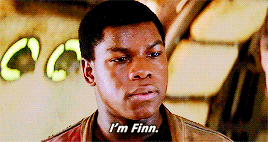
Finn may be a rare case, but we know he is not the only case. Phasma says that Finn’s behavior during the invasion of Jakku was his “first offense.” This indicates that stroomtroopers were known to come out of their brainwashed states from time to time.

So how did the First Order recondition stormtroopers who began to question their brainwashing? It’s possible the First Order employed MKULTRA-esque techniques which included addictive substances (LSD being the main one), hypnosis (way more on that one later), sexual abuse, and brain electrodes. Regardless of the tactics used, the result was the same—controlling the behavior of an individual to eliminate their free will.
While we don’t exactly know the layers behind what the First Order does on the “second offense” it is interesting to note the parallel between what the US did (with the Nazis) to create a brainwashed army against the Russians and what the First Order does to create a brainwashed army against The Resistance.
MKULTRA, The Magician, and the Manipulation of Ben Solo
We know from declassified intelligence on the MKULTRA program that the operation’s goal was to control a subject’s minds “using a combination of psychological techniques and newly developed pharmacological compounds, to remotely alter a subject’s mental capacities and control his “free will.”” (Source).
Free will—as I briefly brought up before—is a common theme through-out The Force Awakens and arguably Poe is the only character from the new leading cast that truly has it. The First Order, of course, does not believe in free will. Snoke tells Kylo in the TFA novel:
“Kylo Ren, I watched the Galactic Empire rise and then fall. The gullible prattle on about the triumph and truth and justice, of individualism and free will. As if such things were solid and real instead of simple subjective judgments.”
In the Star Wars universe, “free will” can be broken down very simply into having the ability to choose light side or dark side (yes I know it gets more complex than this and thank god TLJ looks like they are going to explore this). For the stormtroopers, they were brainwashed from birth to conform to the First Order’s mentality (i.e. they could only pick ‘dark side’). For Ben Solo, this conversion was far more complex, mainly because—unlike the stormtroopers who had nobody but the First Order as children—Ben had to deal with both the light and the dark. He dealt with both the devil’s voice in his head, as well as the lessons of the light side that he would have learned from Luke and Leia, especially.
So how does Snoke get into Ben’s head when he knows that there are other forces that will attempt to persuade Ben away from the dark side and towards the light?
Enter another MKULTRA tactic: The Magician
A principle player in the study of mind control and the manipulation of human behavior was American magician John Mulholland. The surviving documents from Mulholland’s materials written for CIA experimentation (“The Official CIA Manual of Trickery and Deception”) reveal extensively the thought process behind the manipulation of the mind through common place “magic,” hypnosis and illusion. For Mulholland, illusion and trickery boil down to the ignorance and the vulnerability of the subject that he is tricking.
The Magician and Mind Tricks
As I stated in the beginning, Snoke is Star Wars’ magician. We see this even visually. Snoke only appears as an illusion, a towering, rather mystical figure in the darkness. We never see him and we have little knowledge of his actual form. His size can even trick us into thinking he is more intimidating than maybe he actually is.
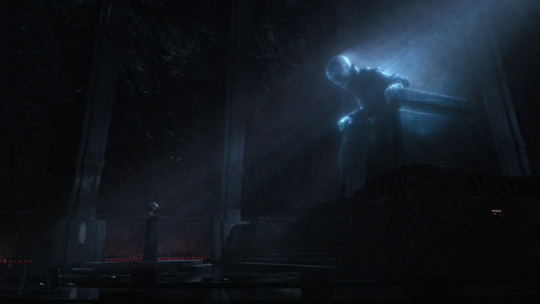
We know little about Snoke besides that he has been around for a very long time. However, we know enough to conclude that he is highly intelligent, power hungry, and manipulative, more so than Palpatine (unless he is Palpatine…I’m not doing that theory here). Even though we know very little about this powerful force user, we still know enough of what he has done to compare Snoke to CIA magician John Mulholland.
Here are some views from Mulholland’s writings:
Mulholland believes that magic and deception work because of false beliefs assumed by the public because they are too ignorant to think otherwise or really take a good hard look behind the curtain. He states that one common misconception is that:
“the hand is quicker than the eye… Stating that the hand can move more rapidly than the eye can follow suggests that a movement can be made and the hand returned to its original position so quickly that no motion at all is discernible. This is not possible.”
However, people assume that that is why the trick works anyway because they do not look any deeper than what they already believe to be true. This—in Mulholland’s mind—leaves many people easy to manipulate and shape because they will not look further to discover what is being told to them.
To further support this thought process, Mulholland continues by writing that:
“The world has the opinion that the goldbrick seller is one who has the ability to give a super sales talk. Actually he is merely a trickster with knowledge of the weaknesses of human nature. To summarize from these few typical examples, the public holds wholly, or largely, untrue beliefs about how all trickery is accomplished. The public is satisfied that these false beliefs explain every deception, while actually the public has almost no factual knowledge of the methods used to deceive. One not aware that these generally accepted beliefs are false will be bothered subconsciously and can never learn to perform any false action smoothly and easily.”
In other words, those who trick and deceive are simply those informed and enlightened enough to know that certain beliefs are untrue. The rest fall in line like sheep to herd.
Additionally, he writes that:
“The basic principle in performing a trick is to do it so that the secret actions are not observed. As Alphonse Bertillon said, “One can only see what one observes, and one observes only things which are already in the mind.” A trick does not fool the eye but fools the brain.”
This is important because Mulholland stresses that tricks only work if the basis of the trick already exists within a subject’s reality. From there, it’s the deception of what the subject already knows to be true.
He furthermore stresses the importance of timing:
“Timing also is most important. Timing has two elements. One has to do with when the trick is done. For instance, it obviously would be wrong, in the example above, to handle the saltcellar immediately after another person has used is successfully. The other point in timing is the cadence in a series of actions. The accent is given to what is wished to be noticed. There will be little attention paid to those actions which are not stressed.”
And finally, Mulholland adds that for any trick to work, the magician must know the subject that they are tricking:
“Before a trickster can plan a trick, he must know who the spectators are to be. This does not mean knowing their names and addresses. It means knowing the kind of people that they are and their nationality. For instance, one might base a trick on the action of borrowing a watch and then find that none of the spectators carried watches. Or the trick might require the trickster to slap a spectator on the back only to discover that all the spectators were Hindu, who would resent being touched. These are examples of actual cases where the trickster’s lack of knowledge of who the spectators were precluded the performance of the trick which had been planned. The more the trickster knows about the spectators the better he can plan the trick to assure that it will succeed”
So to summarize:
Trickery and deception are based on finding a subject you know well at the right time who accepts that false beliefs are true and therefore are easy to trick and manipulate because they do not know any better than to be deceived. Additionally, subjects are limited to what they already know and the trick of deception is to manipulate concepts and ideas that they are aware of. This will confuse the very things they know to be logical or rational.
So…if you were a great trickster and a master of delusion and you follow these principles…getting into the mind of an impressionable child literally before the child is born so that they can’t do anything but accept false beliefs, all the while basing your deception off of conceptions in their reality (a love of the father for instance…) would all be INSANELY ideal.
Well, as we know, this is exactly what Snoke does.
Snoke’s grand trick is making Ben Solo believe that Snoke is more his father than Han…a trick Han is unable to stop since Leia—in good intentions—did not tell Han that Snoke had any hold on Ben. Snoke takes from a very young, wide-eyed child what he knows as the concept of his true father (Han) and confuses this reality, deceiving his feelings towards his true father to become the father Ben never believed he had.
Lets look at evidence for this:
In TFA, Kylo is always asking Snoke for “his guidance,” praising him that he is “wise,” and attests that by the grace of [Snoke’s] “training” he will “not be seduced” by any other power but what Snoke has been indoctrinating into him since birth (the dark side). Now this could also explain a mentor-mentee relationship. He could say these things about Luke if the plot had gone differently and Kylo was still Ben training at the Jedi Temple. But there is a very intimate [book’s word] relationship between Kylo and Snoke.

In the TFA novelization, Snoke differentiates between Kylo and Hux. The novel states that when Hux exits the room, Snoke spoke with “an intimacy in his voice, a familiarity that stood in sharp contrast to the commanding tone he had used with Hux.”
Additionally, it is alluded to that Snoke knows Kylo better than any other person including his own paternal father. From the TFA novel:
“That’s all she is, yes. A scavenger from that inconsequential Jakku. Completely untrained, but strong with the Force. Stronger than she knows.” His mask off, Ren replied with what seemed to be his usual assurance. No one else would have sensed a difference. Snoke did.
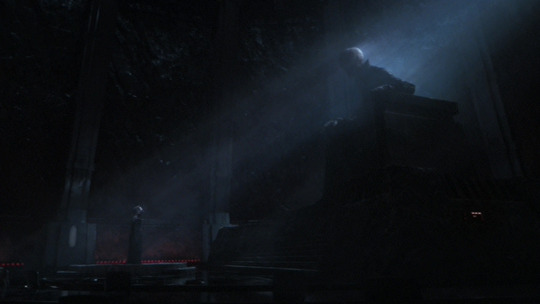
This is also significant because it means Snoke can measure and understand Kylo’s every move. Why? Because every one of his emotions has been created by Snoke. Imagine if you built a machine and it suddenly started acting in a way you didn’t program it. The machine started showing intelligence and free will and free thought beyond computer code. You would notice, right? Snoke sees Kylo as nothing more than a very well programmed machine—as the magician sees the public who is easily fooled by magic tricks as foolish imbeciles ready to deceive. Kylo is predictable, easy to trick, and complacent.
Furthermore, Leia reveals that the relationship of the father to Kylo is important. She tells Han that Luke couldn’t reach Kylo because he was a Jedi while Han was his father. However, Leia did not factor in that while Han is Kylo’s paternal father, Han is not Kylo’s father figure. In the moment where Han has the ability to indeed reach Kylo on the bridge, Kylo is simultaneously under pressure to impress Snoke, the father figure. Since Snoke has always been more of a father to Kylo, Kylo obeys Snoke, giving into his “father’s” “test” to kill Han. What we see, though, is Kylo is emotionally devastated. He kills his own, true father for the father who has deceived him from birth. This shows that Snoke’s hold on Kylo only runs so deep; it’s synthetic. It’s a trick.

Hypnosis and the Mysterious Appearance of Darth Vader’s Helmet
Besides substance abuse and conditioning tactics, the CIA also employed hypnosis in the early 1950s. According to declassified documents, goals included:
-“the creation of ‘hypnotically induced anxieties’" -"hypnotically increasing ability to learn and recall complex written matter" -"hypnotically increasing ability to observe and recall complex arrangements of physical objects" -“and studying "relationship of personality to susceptibility to hypnosis.”
Hyponisis during MKULTRA was responsible in one account for making a subject assemble and appear to detonate a bomb without ever be conscious of doing it.
How does this apply to Ben?
As established in the last section, I theorize that Snoke has tricked Ben into believing that Snoke is his primary father figure from birth because Snoke knew exactly how to trick a vulnerable mind. But how did he keep his hold over his “son”?
MKULTRA used a variety of tactics to keep each subject in line. So clearly more than just trickery from an impressionable age were utilized on him.
This is where I think hypnosis plays a role.
Hypnosis in the MKULTRA program can be traced back to 1954. It was led by Alden Sears at the University of Denver and the University of Minnesota, as well as across various hotel suites throughout the country. According to declassified documents, the hypnosis program under MKULTRA asked:
“Can auto-hypnosis be taught so as to be as effective as hetero-hypnosis in the canceling out of pain or other stress conditions; i.e., if this can be done a person could create his own world and be happy in it even though he were actually confined in a very small place which was extremely filthy...” [source]
So hypnosis wanted to cancel out pain (feeling) in order to create personal “worlds” that people could be “happy in” even if they were not true…mmm…
Where does this sound familiar?
In the TFA novel, Snoke tells Kylo that the Empire fell because Vader betrayed his master and saved his son. “Sentiment,” Kylo answers in the TFA novel when asked what corroded the Empire and allowed the Republic to rise. Like any powerful figure on the dark side, Kylo is being trained to reject emotion in order to cancel out pain. In this case, Kylo sees the pain of Anakin’s redemption as death (more on this later). Making Kylo believe that emotion and the pain of death (Vader’s ultimate fate) are all that can be found on the light side draw Kylo into his own world within the dark side.
Kylo’s “own world” is seen several times through-out TFA. The first and most obvious is the personal moment between him and what he imagines to be the spirit of his grandfather (more on this later). Additionally, when Hux is giving his Hitler speech to the stormtroopers before the attack on the Republic, Kylo is seen alone, away from the crowd, watching the destruction from afar. And it does seem that Kylo is constantly left in a place that is very small and–allegorically–extremely filthy even if he doesn’t see it.
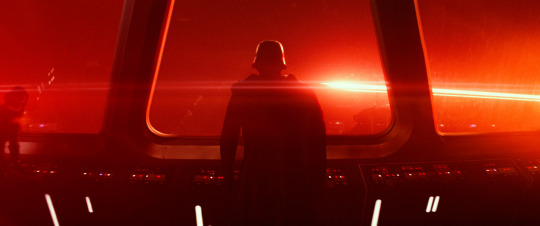
Documents also explain that hypnosis was particularly interesting because it could place people in “dissociative states…using hypnosis.”
In TFA, Snoke has forbidden Ben Solo’s name to be said in the Order and we see him placed behind a mask—a false identify, covering “the face of [Han’s] son,” for the majority of his scenes in TFA. Kylo Ren is a dissociation from Ben Solo.
“Using hypnosis,” is a broad term. MKULTRA administered hypnosis utilizing amnesia and drugs. Just looking at hypnosis in the encyclopedia, hypnosis is defined by intense focus that requires subjects to ignore all aspects of the subjects’ environment other than the thoughts/actions that the hypnotist wants the subject to recognize. This is commonly delivered through a mantra or a set of repeated words and/or use of a repeated object.
Huh…what object could POSSIBLY be used for something like this in TFA??

For starters, yes, I do think it’s possible that Snoke sat a young Ben down at a young age and used Vader’s helmet along with a repeated mantra to drill something into Ben’s brain. I think this repeated phrase used by Snoke was “you will never be as strong as Darth Vader.” This is why Rey–a new force user who could penetrate Kylo’s brain, yes, but probably couldn’t dig that deeply—picked that line out first.
Think about it…Kylo is an insanely powerful force user. It is established from the first time we see him on Jakku that he is arguably more powerful with the force than he is with a saber.
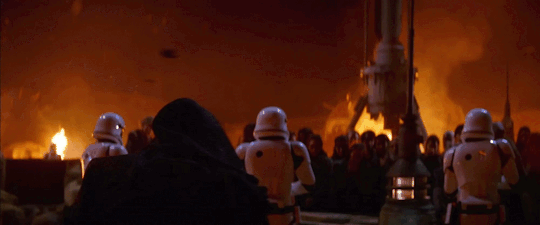
Even he has a difficult time cracking Rey’s mind. While Rey is powerful (“untrained but stronger than she knows”) I severely doubt she would be able to get to the root of Ben Solo’s highly manipulated, rather clusterfucked mind. His fear of “never [being] as strong as Darth Vader” is the first thing Rey sees because it is indeed the easiest to see. It is the one thing that has been placed in Kylo’s mind from birth that he must raise the Empire back to its glory days. It is the false belief that drives him everyday to fall further and further into the dark side in order to appease his father figure.
However, let’s say Snoke didn’t use a set of repeated words. The helmet is still an item that represents something that Kylo has intense focus on that brings him into a false world and that represents every falsity about Vader and Kylo’s own legacy that he has been told.
So let’s break this down.
I’m going to start with the way this scene is shot. We enter this scene with a very tight close up of Kylo’s face, drawing us into a very private, quiet moment (again like Kylo is in his “own world”).

We get one wide shot which shows how enclosed, dark, and empty the room is. There is very little light and Kylo seems to blend into the background easily as if him and the object are all sharing one small, intimate space.

We get another close up shot, bringing us back into Kylo’s head. And then we are finally left with Vader’s mask, Kylo’s own mask disappearing as it is replaced with the helmet of ash. Both masks are tragic—they are holding onto identifies (or lack thereof) that do not exist. One has been redeemed, the helmet burned, and the man released. The other is the result of intense manipulation and indoctrination brought upon an impressionable young boy who has yet to escape from it.

And the fact that Kylo’s mask stays on this whole scene is incredibly important. This is because this is Kylo speaking to Vader’s helmet—the hypnotic object that consistently brings him back to the dark side via Snoke’s orders/manipulations. This is not Ben. This is not a man with a real identity. I’m going to come back to this later.
Now let’s look at the dialogue.
“Forgive me…I feel it again…the call to the light…the supreme leader senses it.”
There are a few things going on here. For starters, Kylo approaches the helmet only when he feels himself losing the beliefs that he has been manipulated (or “hypnotized”) to believe. This further suggests that the helmet acts as the object of hypnosis, separating Ben from Kylo, since this moment only occurs when Kylo feels like he is losing Snoke’s vision of how Kylo should see himself. If he goes to the light, he will never be as strong as Darth Vader. Instead he will be Anakin, who burned the Empire down and died as a result. This is furthermore identified by the explicit mention of Snoke (“the supreme leader senses it”), again identifying that Kylo only cares about what Snoke thinks. His own thoughts are meaningless.
“Show me again the power of the darkness.”
This is particularly interesting because—to our knowledge—it’s not as if the helmet is possessed by Anakin’s force ghost. Also from what we know of ROTJ, when Vader died, he returned in Anakin’s force ghost after saving his son, showing he was redeemed. Furthermore, Kylo knows his grandfather died good since Snoke says that sentiment killed Anakin. What he is seeing is what he believes to be the true visage of his grandfather—the visage that could have escaped death. This is likely something that was also implanted in Kylo’s brain…that the light and that love only lead to death, to ash. The melted, burnt helmet of his dead grandfather brings that right home. And if this is indeed the object of hypnosis, it makes sense why he is asking the object to bring him back to a brainwashed/manipulated/hypnotized state when we know that—if Anakin was involved in this plot line—his force ghost would likely be beckoning his grandson to return to the light. Vader died as Anakin. Vader died good and redeemed. That helmet is meaningless.
“Show me, grandfather, I will finish what you started”
Going back to the point that I made before, Kylo referring to the helmet as “grandfather” indicates that Kylo sees VADER NOT ANAKIN as his grandfather even though Vader was essentially erased in the last moments of Anakin’s life. This goes back to how Kylo consistently replaces his actual family with “figures” (i.e. how he thinks of Snoke as more of his father than Han and here how he thinks as Vader as his grandfather over Anakin).
Kylo does indeed “create his own world” as a result of hypnotized anxieties (see MKULTRA hypnosis goals) within his own disassociated state (a masked identity).
We do not see Kylo in this state the whole movie though and there is a very explicit moment where he—if even for a few moments—does find Ben.
Breaking the Hypnosis and Rejecting the Magician—“The Girl I’ve Heard So Much About”
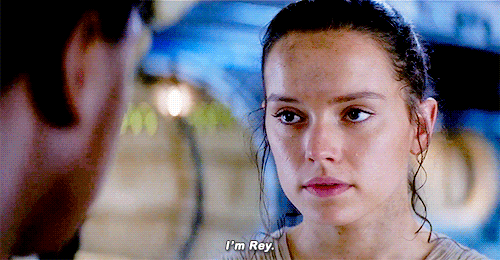
The biggest hint we have that Kylo is indeed a manipulated personality and not actually part of his true self (Ben) is through his interactions—both physically and just through mentions of—Rey. There is a lot of fantastic meta out there about the relationship between Kylo and Rey explaining all of the intricacies between these two characters. I will try my best not to repeat a lot of what has already been (very well) said. But I do want to focus on the differentiation between Kylo’s moment with Vader’s helmet and the interrogation scene.

Before I get there though…let me point something out.
It is no secret that Kylo is terrified of betraying, upsetting, disappointing, etc. Snoke. Anytime he feels like he has failed his “father” figure, Kylo notoriously lashes out. As Rey picks out from his brain during the interrogation scene, Kylo’s “deepest” fear (at least the manipulated, implanted fear) is not being able to become Vader—or become the hypnosis object that Snoke tells him he must become. Pleasing Snoke and doing what Snoke says is of course the key to being stronger than Vader and thus avoiding death.

However, there are several instances in TFA where Kylo blatantly avoids his mission and betrays his orders. All of these involve Rey.
Example 1: “…never be as strong as Darth Vader”
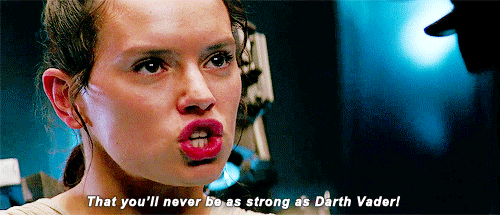
When this scene occurs, Kylo is noticeably set back. This could be for various reasons, but likely because he can’t believe this girl just got into his head. He is so set back by this, he completely abandons his attempt to get any information out of Rey and essentially cries to Snoke that “this girl’s too strong.” All of the persistence he had in the beginning with Poe is gone and he–even at the risk of disappointing Snoke–turns away from his mission.

Example 2: The Forest Meeting
The odd connection between Kylo and Rey has been said before (i.e. the many observations on why the actual fuck Kylo would bridal carry a woman through an open battle that the First Order doesn’t even have on lock. They are surrendering. Yet…here he is walking around pretty freaking defenseless carrying a girl he apparently doesn’t care about).
Before this scene, Kylo betray’s Snoke’s orders. Kylo and the stormtroopers are on Takodana for the droid. He has been looking for this freaking droid since the beginning of the movie. That was the point. He knows that. He’s good at doing his job. Yet when the droid is within reach he abandons his mission for Snoke and takes this interesting girl that he clearly knows somehow (I’m not going to speculate on that one too much. That’s a different conversation).

Example 3: “I can show you the ways of the force”
In the forest battle on Starkiller Base, Kylo is supposed to find a way to knock out Rey and bring her to Snoke. This is I think the meaning behind knocking her against the tree, but really it just results in her getting a hold of Luke’s saber and raising it to fight him—something that he does not want to do whatsoever…I mean look at that face…

Does that look like a face of a man who wants to kick somebody’s ass? No. No. It doesn’t.
Regardless, as Kylo is attempting to disarm her, he eventually abandons this mission too and asks to be her teacher. We have a pretty good idea that this is KYLO’s mission not SNOKE’s mission since in the TFA novel a voice—presumably Snoke—tells Rey to “kill him.” If Kylo was speaking for Snoke, why would Snoke want Rey instead of Kylo?

Example 4: “You imagine an ocean”
And then of course in the interrogation scene, Kylo spends time doing anything but what he should be doing….finding information about the map for Snoke. Instead, Rey’s ocean dreams are just so much more important and Kylo once again abandons the point of his mission to find out this girl’s dreams.
This is where I want to revisit the “talking to the Vader helmet” scene.
That scene—Kylo and the hypnotic object—take place in a very similar room. However, the interrogation scene is much brighter and less closed off. Kylo doesn’t blend into the background as he did before. Most importantly, Kylo keeps his mask on during the scene where he talks to Vader’s helmet.


Now flash-forward to the interrogation scene.
This is the first time we see Kylo remove his helmet and show us the first indication of a real identity…of Ben. Kylo goes as far as to put the helmet in a bed of ashes. The last time we saw something that resembled ash, it was Darth Vader’s helmet, representing the death of his grandfather due to “sentiment.” Here, the cover of Ben’s identity is being placed in a bed of ashes, suggesting if for a second that Ben wanted to “kill” the identity of Kylo, to, what? Make this girl more comfortable? It sounds out of character because–for Kylo–it is.
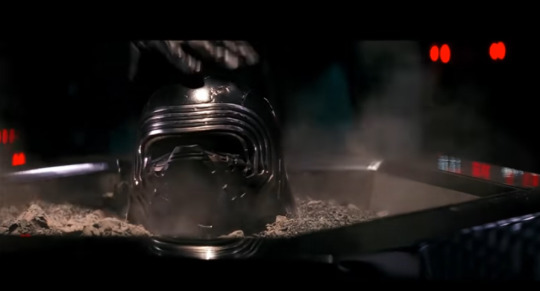
It is no coincidence that this scene happened with Rey…the girl he had “heard so much about,” that initially triggered his “call to the light” in the first place and the girl who he was consistently abandoning Snoke’s orders for. And I can’t stress enough how incredible that is. Kylo—for his curiosity in a girl—consistently seems to forget and disregard the commands of a powerful, influential father figure who has implanted falsities and delusions within Kylo’s brain from birth. This is not because Kylo is just simply interested—intellectually, sexually, what have you—in Rey. It is because this is how flimsy the manipulation of Kylo Ren’s mind really is. It takes one girl.

And Snoke knows this.
The whole interrogation scene, Ben is attempting to get the fuck out of Kylo’s head. It’s why we see his face. Its why we see him probing into Rey’s thoughts, attempting to understand her and know more about her. He doesn’t draw back into Kylo until he comes across Rey’s appreciation for Han Solo. When this occurs, Ben fades, Kylo snaps back, and continues his mission to find the map (Adam Driver is amazing in acting this out. His face goes from angry and intimidating, to curious, to actually almost smiling, and then immediately back to angry when he comes across Rey’s thoughts of Han). Of course this only lasts until Rey fires back his own thoughts at him, to which he then gives up and flees to Snoke, risking any shame he will inevitably feel at his failure.
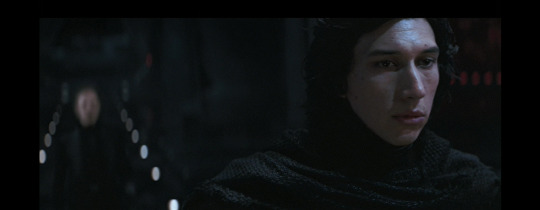
And again Snoke knows this. He calls Kylo out. “You have compassion for her,” Snoke accuses. Snoke’s next statement is far more revealing. “Kylo Ren. It appears that a reminder is in order. So I will show you the dark side.”
Why would a character who believes in the dark side and the power of the dark side NEED A REMINDER?
Snoke fears Rey. He explicitly knows that everything he has built up within Ben from birth to make him Kylo Ren can easily slip away. I also believe that this is why Snoke tells Rey to kill him in the novel. He knows that while she is alive, she is able to break the hypnosis…the illusion…the control and he may very well be powerless to stop it. I think Snoke also knows that while Kylo attempted to once again prove himself to his father figure by killing his paternal father, the death of his father only weakened him. If Anakin had had the high ground and slashed Obi-Wan to pieces, ROTS made it clear that he was too far gone to care about Obi-Wan. However—again Anakin made that conscious decision. Anakin had the dark side within him and embraced the dark side with everything he had.
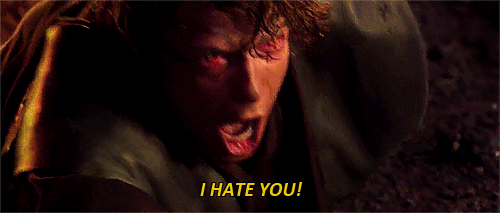
Kylo does not. Kylo cannot and should not be considered part of the dark side because all he has of the dark side is a lie told to him from an impressionable age with little hope in ever breaking away from it. Snoke knows this. Snoke knows that—even when he killed his father—he was not strong enough to hold the illusion.
Snoke knows that Ben will not stay dormant forever and that the hypnosis will fade away and the illusion will be broken as Ben decides that he can look past the magician’s tricks and stop accepting false beliefs.
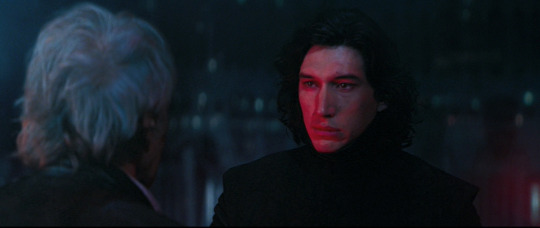
My only hope is we see this in TLJ.
#kylo ren#kylo meta#reylo#ben solo#snoke#kylo x rey#history parallels#star wars#the force awakens#tfa#the last jedi#tlj#star wars theory#fan theory#mkultra#operation paperclip#the first order#anakin skywalker#darth vader#redemption arc
66 notes
·
View notes